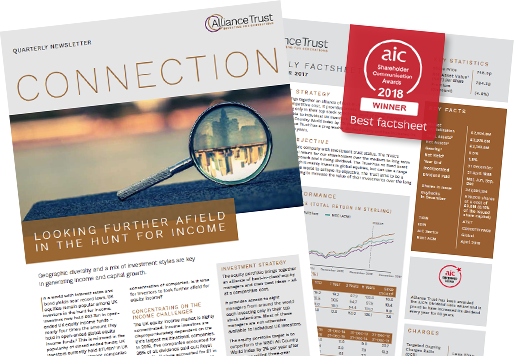Ignore ‘style’ labels and invest in durable franchises
Investing ‘styles’ are often used by commentators to describe how fund managers categorise and approach the investments they make. The two most common are ‘growth’ investing, a strategy that seeks companies that are growing their earnings at a rapid clip or will likely do so in the future; and ‘value’ investing, which seeks companies that, by various accounting metrics such as price-to-earnings or price-to-book ratios, appear cheap.
For various reasons, the performance of higher ‘growth’ parts of the stock market in recent months has been torrid, particularly for technology stocks. It’s led to much discussion that a market rotation is underway, as investors switch focus from ‘growth’ stocks to ‘value’ stocks, which tend to be more sensitive to business cycles and perform more strongly during economic recoveries.
If we look to indices that focus on these individual styles, we can see some evidence of this. This year to end May, the broad MSCI All Country World Index (ACWI) lost 6.3%, while the MSCI ACWI Growth Index lost 15.5% versus the MSCI ACWI Value Index which gained 3.0%.
In truth, long-term investors should ignore these ‘style’ labels, as drivers of individual styles are complex, rarely stacked behind a particular one, and unlikely to last for extended periods. Instead, what is best to focus on is what is known: that share price returns are ultimately driven by investing in economically entrenched businesses that can build on their profits over long periods of time.
What’s driven the sell-off in technology
As the world awakes from its pandemic nightmare, business supply chains, many of which intricately criss-cross around the globe, have been grinding back into action rather sluggishly. This is inflating prices, alongside the rising cost of raw materials and energy which are being stoked further by the war in Ukraine and sanctions on Russia.
The increasingly uncomfortable inflationary picture has not gone amiss to central bankers around the world, who have been forced into a more aggressive stance on monetary policy. While they continue to believe inflation remains transitory in nature, they’ve accepted it could hit harder and last longer than previously forecast. As a result, they’ve unleashed a quick succession of interest rate rises, and slated more to come, and begun unwinding money printing programs that have been propping up asset values for over a decade.
This macro environment has unnerved investors in higher growth and expensive parts of the market, namely technology, for several reasons.
First, rising interest rates cause volatility in ‘jam tomorrow’ stocks that promise lots of cash in the future, which is true of many promising technology investments. Analysts use interest rates to value what they think a firm’s projected future cashflows are worth today. The higher rates go, the lower the cashflows are valued, meaning the stock becomes increasingly less desirable.
Second, that in this environment, and as market starts to price in a recession, an obvious strategy for investors is to move into ‘jam today’ stocks that are more economically responsive and cash generative, as ‘value’ parts of the market often tend to be.
Third, that as inflation feeds through into wage negotiations, it will start to affect the already high salaries tech firms must pay for specialised employees. Even though they are often able to pass on rising costs to their customers through price hikes, analysts worry this may affect sales.
Fourth and finally, given the popularity of technology in the preceding decade, boosted further during the pandemic, and the length to which the values of tech stocks have risen - a correction has long been forecast in a world where stock markets tend to revert to long term averages.
Stock picking more important now than ever
Although the market correction has been sharp, the pain may not be over for technology. While public markets react quickly to new information and data, private company valuations often experience a lag. Given that we have seen little by way of private market revaluations over the past six months in comparison to public market peers, significant readjustments seem likely to follow and indeed there are early signs of this.
What is more, the quality of firms varies widely across the sector. Some may not survive the bear market as a focus on profitability has not been in their DNA. Those that cannot figure out a way to grow both profit margins and revenues will be acquired by owners who can. It means buying the sector more widely on the dip could be folly.
Yet, the drop in valuations – between 40 – 70% in public markets – represents an attractive entry opportunity for discerning stockpickers. With a focus on delivering long-term performance for generations of investors through a global portfolio of high conviction stocks contributed to by nine separate investment teams, Alliance Trust looks through short-term market volatility and style labels to invest in durable and profitable franchises that stand the test of time.
Within the technology sector, managers seek businesses that often reside under the umbrella of secular investment ‘themes’ – powerful long term business trends – which, through unique technology-driven advantages, can protect themselves from competition and retain pricing power and therefore strongly grow and compound their profits long into the future.
Investment themes in the technology sector
Two pertinent ‘investment themes’ from the teams at Alliance Trust are cloud computing and semi-conductors. Various factors are driving these trends – both individually and collaboratively.
Demand for cloud computing is being driven by the ever-growing quantities of data produced globally, and the increasing need for complex and flexible computation. It’s enabling greater employee flexibility – a trend accelerated by the pandemic, and one becoming critical given that remote working is here to stay and growing, and as companies strive to remain adaptable. Cloud has also transformed software by giving way to subscription and consumption-based service models - boosting profit margins and enabling providers to offer more frequent and seamless software updates and greater ease of use and functionality across their products.
Mark Atkinson, head of marketing and client relations at Alliance Trust, remarks: “Ultimately, cloud computing companies are seeing more recurring revenues via longer-term relationships with businesses which has been the source of attractive growth for the segment. While the growth opportunity is massive, selectivity will be increasingly critical.”
Semiconductors are the essential chips in electronic devices: enabling advances in communications, computing, healthcare, military systems, transportation, clean energy and countless other applications.
Demand in this high growth part of the market seems set to continue given the importance of chips in the increasing digitalisation of the global economy. In the past, demand has been limited to a certain number of devices per human being; in the future, the industry will likely benefit from unlimited applications: the Internet-of-Things (IoT), as well as other new technologies that will demand greater processing power than traditional smartphone devices (virtual and augmented reality, for example).
Atkinson adds: “Current demand for semiconductor chips is vastly outstripping supply, impacting production across a number of industries from car manufacturers to consumer appliance producers – a trend that is likely to continue into 2022. The semiconductor industry is also benefitting from the transition to a world aligned with a 2°C climate target, being critical components in electric vehicles (EVs) and other products that form part of the climate solution.”
Stocks that benefit both directly and indirectly from the migration of businesses toward greater cloud computing include well-known mega-caps such as Alphabet, Amazon, Microsoft or Baidu; as well as Oracle, Dell, Western Digital, ServiceNow, Twilio, Autodesk and salesforce.com.
In the semiconductor sector, companies to watch include Nvidia, Qorvo, Skyworks Solutions, ASML Holdings, Taiwan Semiconductor Manufacturing Company and Broadcom.
All told, while much time is devoted to explaining portfolio strategies through the lens of investing styles, for long term investors the solution for building wealth that Alliance Trust offers is much simpler: invest in entrenched market leading companies that will compound their profits for years to come.
Past performance is not a reliable indicator of future returns. This material contains the opinions of the manager and other external investors and such opinions are subject to change without notice. Forecasts, estimates and certain information contained herein should not be considered as investment advice or a recommendation of any particular security, strategy or investment product. Information contained herein has been obtained from sources believed to be reliable, but not guaranteed.
TWIM is the appointed Alternative Investment Fund Manager of Alliance Trust plc. Alliance Trust plc is a listed UK investment trust and is not authorised and regulated by the Financial Conduct Authority.
Read more investment expertise






